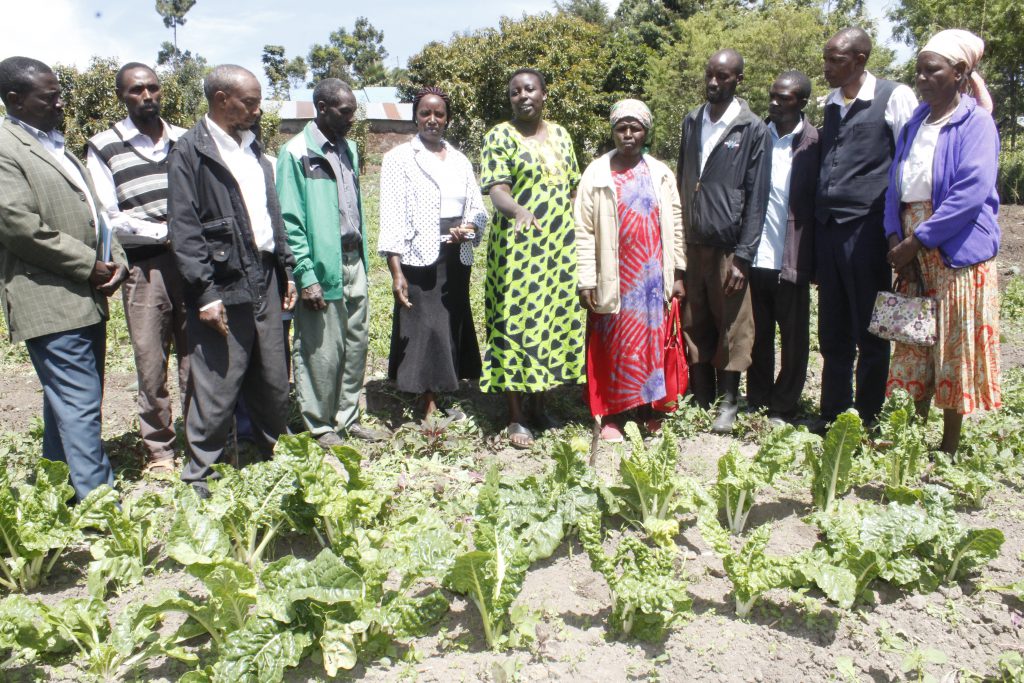
A group of farmers and organic farming eexperts at a spinach farm in Subukia Sub County. The farmers got chance to be trained on how to grow vegetables using organic farming techniques Photo by Dennis Rasto,KNA.
Experts from Egerton University and Kenya Organic Agriculture Network (KOAN) have stepped up training for rural communities in Nakuru County on organic farming with an aim to face off the use of synthetic fertilizers and artificial pesticides that not only are expensive for smallholder farmers but also leave behind harmful chemical residues.
The initiative is also geared towards promoting new markets of organically raised produce in Kenya.
“The aim of this project is to create a new sustainable market system for the crops, including their cultivation, processing, and exporting,” said Rhoda Jerop Birech, associate professor of Sustainable Agriculture and Agronomy at Egerton University.
The initiative has trained more than 5,000 farmers in Nakuru County and 30,000 others countrywide on organic farming.
According to Birech, it is impressive that some farmers have taken note that the seemingly innocuous use of chemical pesticides is threatening food security both in Kenya and world at large.
“Organic farming focuses on managing crop production and soil fertility by making maximum use of natural products and natural processes in the environment, and without using synthetic fertilizers or pesticides.”
Bees are reducing worldwide because of high level use of harmful pesticides in industrial agriculture, yet we need these useful and friendly insects. Pollination cannot take place without insects such as bees. Without pollination food security will face the greatest threat,” said Birech.
RELATED ARTICLE: Farmers’ conversion to organic farming triples yields and earnings
Organic farming is further being fronted as the solution to emerging lifestyle diseases and environment conservation.
The farmers are now growing their crops such as pumpkins, maize, beans, sorghum, tomatoes, carrots, traditional vegetables and fruit organically which is generally less expensive and help the crops become more drought-resistant.
Organic farming is further being fronted as the solution to emerging lifestyle diseases and environment conservation.
Professor Birech explained that the demand for food grown using organic manure has been overwhelming both locally and abroad.
Globally, she explained the demand was growing at a rate of 10 percent annually, while uptake of organic foodstuffs and products was as high as 50 percent in some countries.
RELATED ARTICLE: Farmers move to organic fertilizer as soil acidity takes toll on yields
The don observed that nutritionists and medical specialists recommend such food as it minimizes incidences of lifestyle and chronic diseases.
She said Non-Communicable Diseases (NCD) are the leading causes of deaths in many regions including Africa and this is partly because of the food people eat.
By 2030, in Africa, deaths from NCDs are projected to exceed the combined deaths of communicable and nutritional diseases and maternal and prenatal deaths.
“Certainly attention has shifted to how we produce and consume our food. It is now obvious that to produce enough with heavy use of chemical fertilizers and pesticides that destroy the environment is no longer sustainable. Focus on monoculture (growing only one type of crop) has increasingly become unreliable,” stated Professor Birech.
“Kenya Organic Agriculture Network (KOAN) has been collaborating with the Kenya Bureau of Standards (KEBS), in preparing national standards, to develop a set of guidelines for organic farming production, processing and packaging,” she said.
RELATED ARTICLE: Study: Organic agriculture generates comparable yields for income and health benefits for farmers
In 2017, according to KOAN, the value of Organic agricultural products traded in the Kenyan market stood at Sh 440 million. Sales of fresh vegetables in the local market topped the list at 9820 metric tons, followed by tea and dry cereals at 2500 metric tons and 1800 metric tons respectively.
1200 metric tons of honey, 505 metric tons of nuts and 74 metric tons of fresh fruits produced through organic farming were also sold into the local market.
Over the same period, the Country realised Sh3bn from sales of 104,841 metric tonnes of organic agricultural products in the international market. The leading export markets were United States of America, Western Europe and Japan.